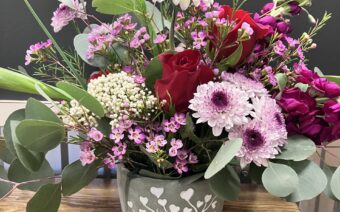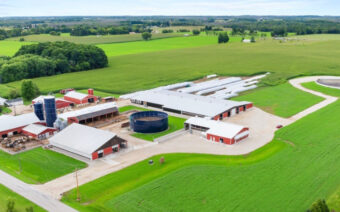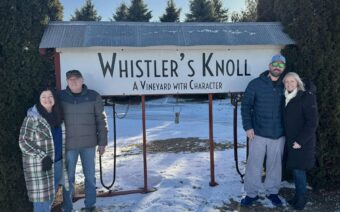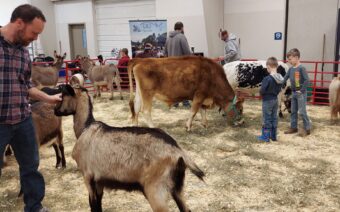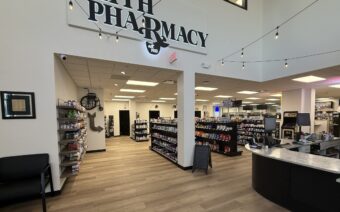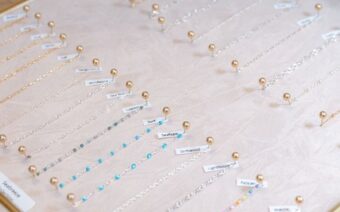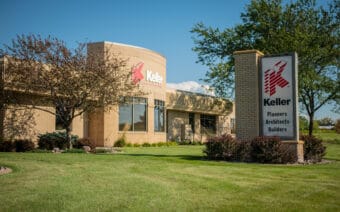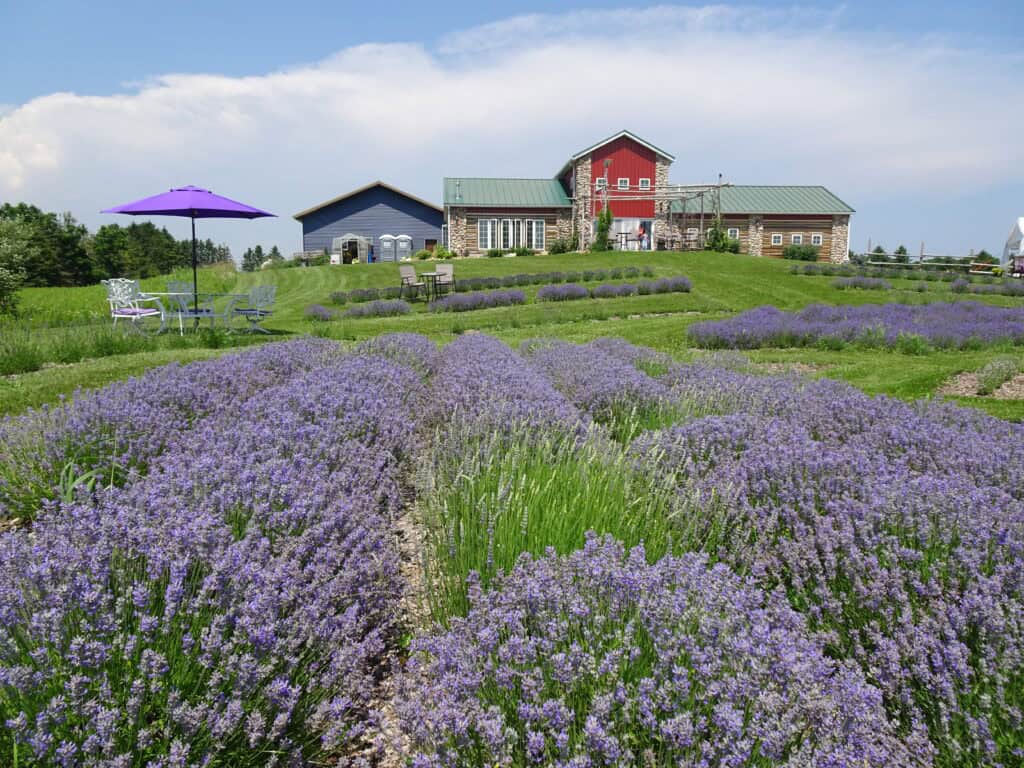
July 28, 2025
KEWAUNEE – Located just about a half-mile from the Lake Michigan coastline sits Glen Innish Farm – Kewaunee County’s first lavender farm.
In addition to producing many of its own lavender-based personal care items, teas and spices, Glen Innish Farm (E5427 2nd Road) is also known for its locally raised beef, sheep and lamb.
It’s all a dream come true for Owners Amber and Simon Hewett.
Five-year business plan
Two and a half years ago, Amber said she and Simon wrote a five-year business plan to create an agritourism destination on their rolling 80-acre property in Kewaunee.
“To me, agritourism is about reconnecting people with the land and with the roots of their food, their wellness and their sense of place,” she said. “In today’s fast-paced world, many have become disconnected from the rhythms of nature and the work that goes into producing what nourishes us. Agritourism provides a meaningful way to bridge that gap.”
The couple said as of 2025, all those goals they set in that five-year plan have already been achieved.
“That accomplishment gave us the confidence to say, yeah, we’re doing this right,” Amber said.
Today, Glen Innish Farm is one of two Kewaunee County agribusinesses listed as members of the Wisconsin Agricultural Tourism Association (WATA) – the other being Pagel’s Ponderosa Dairy LLC.
As an agritourism farm, Amber said visitors have a variety of activities available to them.
“When guests arrive at Glen Innish Farm, they’re greeted with a warm, genuine welcome, often by one of us personally,” she said. “We want every visitor to feel like they’ve stepped into a place where they can breathe a little deeper and reconnect with the land.”
Open from 11 a.m. to 5 p.m. Monday through Friday and 11 a.m. to 3 p.m. Saturdays, Amber said Glen Innish guests have access to the property’s lavender field and self-guided farm trail, “which winds through blooming rows of lavender, native pollinator gardens, peaceful meadows and grazing pastures where our sheep and cattle roam.”
“Along the way, they might spot birds nesting in our habitat areas or catch the scent of herbs on the breeze,” she said. “It’s a sensory-rich experience meant to encourage slowing down, observing and simply enjoying nature.”
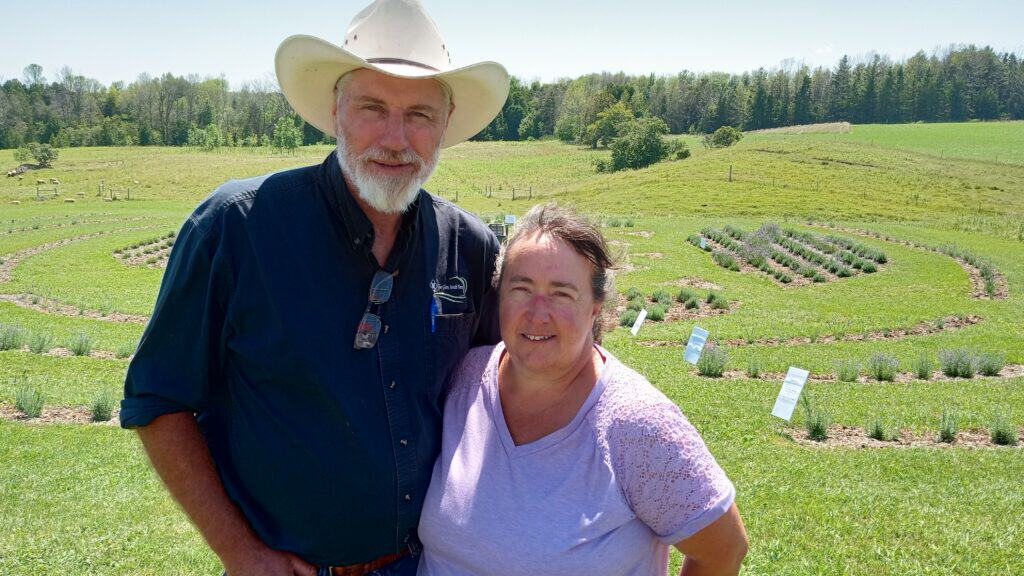
Amber said the goal at Glen Innish is to create a space that reflects their values – sustainability, stewardship and beauty – “while offering a meaningful, hands-on connection to farming life.”
“Whether someone is here for a quiet walk, a seasonal event or to explore the farm store, we hope they leave feeling inspired and refreshed,” she said.
Amber said the property is also home to a “Cabin on the Glen,” which is available for rent.
“During their stay, guests have access to all the seasonal activities happening at the farm, from yoga in the lavender fields to festivals, workshops and farm store specials,” she said. “They’re also welcome to explore the walking trail and main lavender field at their leisure.”
As an added touch, Amber said they planned a smaller, private lavender field exclusively for cabin guests.
“[It’s] a peaceful space to enjoy morning coffee, evening sunsets or simply a quiet moment surrounded by the calming scent of lavender,” she said.
What does ‘Glen Innish’ mean?
Amber said when it came time to name the farm, she and Simon knew they wanted something that honored both their heritage and values.
“Simon and I both have Scottish roots, and we were drawn to the idea of a name that reflected the land’s natural beauty and our shared cultural background,” she said. “In New Zealand, where Simon is from, it’s considered poor form to name a farm after yourself or your family.”
So, Hewett Farm, Amber said, was out of the question.
That, she said, led them to their shared Scottish heritage.
In Scottish, Amber said the word “glen” – which would be spelled “gleann” – means valley, resting place or rolling meadow, “something that perfectly captures the peaceful landscape we’re fortunate to call home.”
Innish, Amber said, is derived from the Scottish word “innis,” which means by water – which is “a quiet nod to the ponds, the creek that runs through the property and our proximity to Lake Michigan.”
Wisconsin becomes their home
Agriculture, Amber said, has always been part of both her and Simon’s identities.
“It was that shared foundation that helped build the vision we now carry forward together at Glen Innish Farm,” she said.
Simon – the sixth generation in his family to work in agriculture – said he’s been working on sheep stations and ranches of various sizes since he was 16.
“I came over [from New Zealand] as part of an ag exchange system,” he said. “I did a couple of summers in Montana.”
Amber said she was raised in Montana and is the fifth generation in her family to work in agriculture, which she further supported with a bachelor’s degree in animal production and a master’s degree in agricultural economics.
“My roots are in beef cattle, and much of my background is grounded in animal husbandry and ranch life,” she said.
Amber said she and Simon met in Montana when he was working with her cousin, managing a beef and sheep ranch.
“His early experience centers around sheep and animal husbandry, where he developed a deep knowledge of flock management and pasture-based systems,” she said.
The Hewetts said they came to Wisconsin in 1998 for an opportunity to manage heifers in Fond du Lac County.
A business opportunity, Amber said, brought them to Kewaunee, and in July 2001, they opened their first business – Lakeshore Dairy Services – which they still own and operate today.
The business, Simon said, provides reproductive services to dairy farmers.
When the couple made the move from Fond du Lac County to Kewaunee, Amber said they received a warm welcome from the community.
“It was almost like coming home…,” she said. “We weren’t even living here for a month and people at the bank were calling us by our first names.”
When they first moved to Kewaunee, Amber said they rented a house for three or four years before building a house.
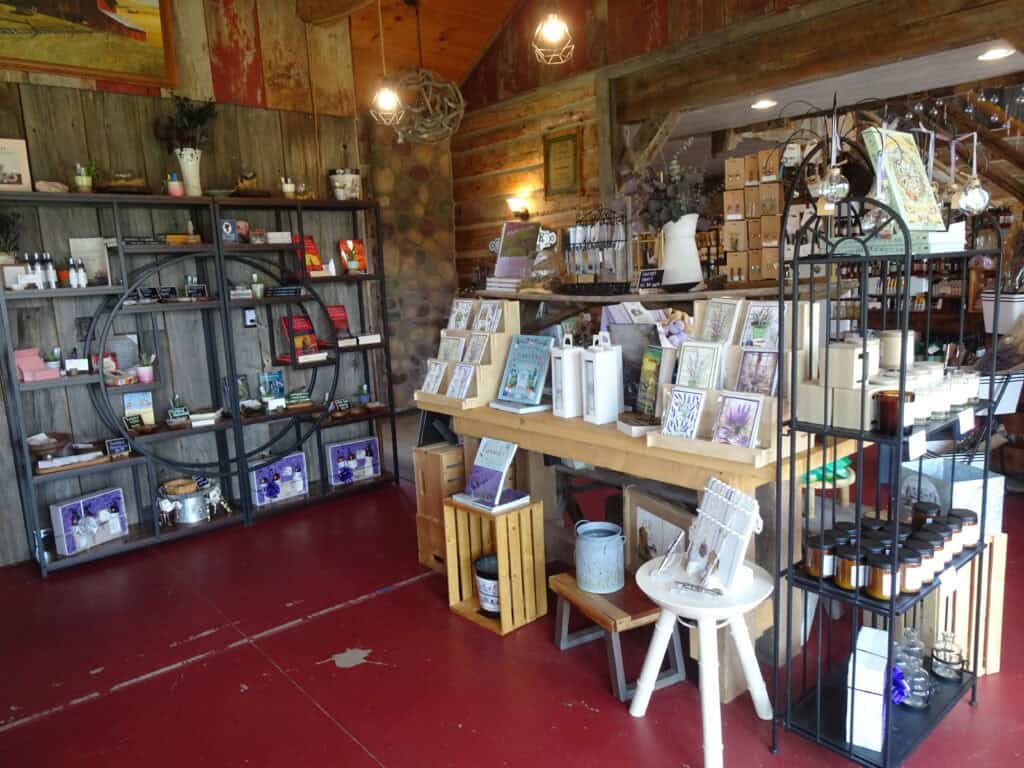
Eight years later, in the fall of 2013, the couple said they purchased the first 40 acres of what would become Glen Innish Farm.
“[That was a] step toward our long-term vision…,” she said. “We built our home and barns there, raised beef and sheep and opened a small farm store where we sold meat by appointment. It was humble, but it was ours.”
Simon said both of their sons – Will and Alex, now both grown adults – showed animals in 4-H at the time.
“That was one of the factors that [inspired] us to buy some acreage,” he said.
‘Lavender found us’
During 2020, Amber said they started thinking about how their land could become a viable business.
“We started to reevaluate – ‘What do we want out of life?’” she said. “We want[ed] to make this land profitable.”
Then, in 2021, Amber said the 40-acre property next to their land came up for sale.
“The place was only on the market for five days,” she said.
Amber said it’s the second 40 acres that the public experiences during a visit to Glen Innish Farm, which features a building the previous owner had designed for entertaining, which serves as the farm store today.
The lavender side of the business, Amber said, “found us.”
“Lavender was really not on our radar,” she said. “I’ve always loved to grow herbs, grow flowers and play in the dirt – but it was a way that I could relax, it was a release of tension, it was always a hobby. It was never something I thought would be a career.”
Shortly after buying the second 40 acres, Amber said they happened to spend a day at a lavender farm.
“We started asking this question, ‘Would it work?’” she said.
Having learned the lay of many lands through work and traveling, Simon said, different geographic locations “[are] a little bit different.”
“You sort of have to learn the land, and that’s the part of it with the lavender here,” he said. “That first year, we put in 100 plants in our test plot.”
Simon said they were “overwhelmed at the result” of that first crop.
“It’s a perfect location for lavender,” he said.
This year, Amber said they anticipated their lavender field would have 4,500 plants, but, because the early March thaw followed by a late spring freeze that was hard on the emerging lavender, about 600 plants need to be replanted before Aug. 15.
Recent heavy summer rains, Amber said, have also tough on some of the lavender.
That’s one of the messages Amber said she wants to educate guests about: that agriculture’s success is determined by many variable factors, especially unpredictable weather.
‘Disconnect’ on the farm trail
The Hewetts said they keep a one-mile trail groomed at Glen Innish Farm, where guests can walk down to Nashek Creek, perhaps see cattle or sheep grazing – which is dependent on the day’s rotation – experience birds and other wildlife and conclude their walk in the lavender fields.
“It gives [guests] a place where they can disconnect,” she said.
The property, Simon said, is home to a lot of wildlife.
“I can’t even begin to count the number of species,” he said. “We have a large population of deer. It’s kind of a nursery ground during the spring, so we have lots of fawns.”
Using the free Merlin Bird ID app, Amber said they once identified 13 bird species during one walk on the farm trail.
“We are right on the migratory path, especially for waterfowl,” she said.
“Peaceful, calming and relaxing” is how Amber said she describes the farm trail experience.
“It gives me comfort and makes it that we’re doing the right thing when they come back from the farm trail,” she said.
Lavender Fest
Currently, the Hewetts said they are busy preparing for Glen Innish’s annual Lavender Festival – a free event, which was expanded to a two-day event this year, set for 11 a.m. to 5 p.m. Friday, Aug. 1, and from 9 a.m. to 5 p.m. Saturday, Aug. 2.
“The field is going to look really good come the Lavender Festival,” she said. “We will be in full bloom by then.”
Amber said the Lavender Festival is one of eight seasonal festivals they host throughout the year at Glen Innish Farm.
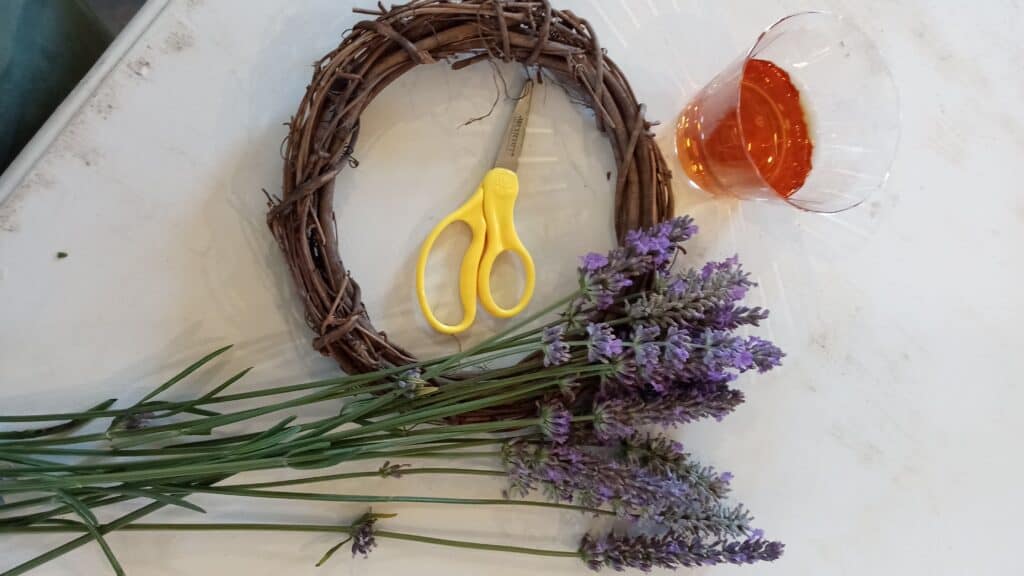
“Each of these events is inspired by the Celtic Wheel of the Year – a traditional calendar of seasonal celebrations rooted in Scottish heritage and closely tied to agricultural rhythms,” she said.
The Lavender Festival, specifically, Amber said, takes place at the time of Lughnasadh (pronounced “LOO-nuh-suh”) – the ancient Celtic festival marking the beginning of the harvest season, she said.
“For us, Lughnasadh aligns beautifully with the peak bloom and harvest of our lavender fields,” she said. “It’s a time when the farm is alive with color, scent and activity – perfect for welcoming guests to experience the beauty and bounty firsthand.”
Some of the activities and workshops offered during the festival, Amber said, will include lavender oil distillation, a painting class, a flower bar – where participants can make floral arrangements with wildflowers and cut flowers – and yoga in the lavender field at 8 a.m. on Aug. 2.
Furthermore, Ace Champion – an ancient native tree flute “air bender,” also known as “Good Buffalo” – Amber said, is performing both days from 3-5 p.m., and a barbecue food truck will be on site for food purchases.
Lavender non-alcoholic beverages, Amber said, will also be available for purchase, as will local wines, two New Zealand wines and local beers – including a lavender wheat beer named SunWeaver, which is specifically made for Glen Innish Farm by Lake Whispers Brewing LLC in Kewaunee.
“It’s a very light, refreshing summer beer with a hint of lavender,” she said.
The Snug
A recent addition to Glen Innish Farm, Amber said, is an area off the farm store called The Snug, which serves as a nod to Scotland’s traditional “conversational bar.”
Opening The Snug this summer, she said, was “the next step in the evolution of the business.”
“In business, you’re either growing or you’re shrinking,” she said. “You can’t stand still.”
Details on other upcoming events, he said, are available at gleninnish.com.
Transitional year
Simon said 2025 has been somewhat of a transitional year for Glen Innish Farm.
“Up until this year, it was pretty much a mom-and-pop [business] with the help of friends,” he said.
Today, Amber said they have two part-time store employees and plan to hire a full-time farm employee in the near future.
“Our next stage [in the business’s progression] is to do more wholesale with the lamb and the lavender,” she said. “On average, we will put through the store 16-20 lambs and two to three steers a year.”
Maintaining what they have already created, the Hewetts said, is also important.
“At Glen Innish Farm, we see agritourism not just as an opportunity to share our work,” Amber said, “but as a way to build community and foster deeper respect for the land and those who care for it.”
The couple said they believe farming isn’t just about what you grow – “it’s about what you nurture.”
“If guests leave feeling just a little more present, more inspired or more in tune with the world around them, that means we’ve done something right,” she said.
 Lacing up a legacy: Premium boot company stays true to American workers, history
Lacing up a legacy: Premium boot company stays true to American workers, history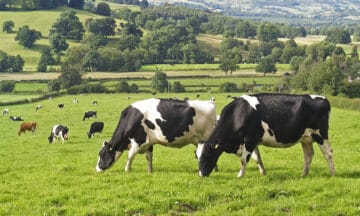 Westby Creamery announces $14 million expansion
Westby Creamery announces $14 million expansion


